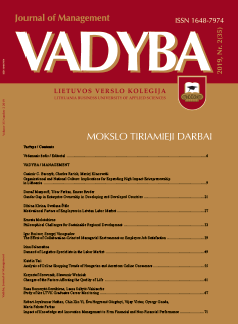THE DEVELOPMENT OF SMALL BUSINESS AS THE BASIS FOR THE SUCCESSFUL FUNCTIONING OF THE LATVIAN ECONOMY
THE DEVELOPMENT OF SMALL BUSINESS AS THE BASIS FOR THE SUCCESSFUL FUNCTIONING OF THE LATVIAN ECONOMY
Author(s): Yuri Kochetkov, Elena SventitskayaSubject(s): Business Economy / Management
Published by: Lietuvos verslo kolegija
Keywords: micro and small business; state aid; graph theory;
Summary/Abstract: In Latvia, as in many developed countries, micro and small enterprises make up a large proportion (over 98%) of businesses. Small business is not given due attention, there is no general concept of small business development, and there is a lack of support system for start-up entrepreneurs. The objective of the article is to identify the main socio-economic factors and the nature of their influence on the functioning of micro and small enterprises in Latvia. The novelty of the research lies in the fact that for the first time the overall system analysis of the main factors affecting the functioning of the small business cluster in Latvia has been performed. The object of the research is a cluster of micro and small enterprises in Latvia. The goal of the research is to develop recommendations for improving the functioning conditions of small businesses. Methods of research comprise system analysis, analysis of statistical data and mathematical modeling. The theory of soft systems has been applied, in which the subjective factor (i.e., people) plays an important role. A cognitive map has been developed that reflects the interconnections and influence of the main socio-economic factors on the work of small and micro businesses in Latvia. The developed cognitive map is a sign directed graph – a mathematical model. It is established that the digraph under consideration and the system described are unbalanced. In general, the system is not stable enough. The situation of micro and small enterprises may deteriorate under the influence of various factors. According to the graph theory, the corresponding system of factors will be both absolutely and pulse unstable. This means that some impact on the system at one of its vertices can cause a “chain reaction” at other vertices and lead to undesirable consequences. To predict the behaviour of the system described by the digraph, an analysis of pulse processes in the system has been performed. Pulse is a single impact on the vertex of the digraph, for example, the effect of legislative change in taxes on enterprises in the direction of their reduction or increase. Using the calculated forecast values of the digraph vertices, it has been found out that the most positive influence on the functioning of micro and small enterprises is made by the state. As a result, this contributes to the growth of people’s income, the inflow of working-age population and qualified personnel into the regions and a decline in the unemployment rate. As a result, the state also benefits, since the increased tax revenues are collected, the unemployment rate is reduced and less people move abroad for work. Political tension and international sanctions also exert a negative impact on small businesses. They lead to the opposite effect – lower income, higher unemployment rate, the departure of people to work abroad and the “decline” of individual regions.
Journal: VADYBA
- Issue Year: 36/2020
- Issue No: 1
- Page Range: 85-91
- Page Count: 7
- Language: English

